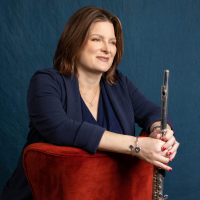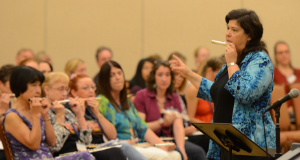News & Updates
Recent Blog Posts
Developing a Private Studio, Vol. 3: Recruiting by Building Relationships
By: Charlene Romano
This blog post is the third in a four-part series on developing a private teaching studio.
As I mentioned in Part 1, one of the questions I am most often asked is about how I find new students. My preference is to teach middle and high school age students, and I do have a number of beloved adult students now. (An adult student who sticks around is one slot you won’t have to recruit for while they’re in your studio, and I have students who have been with me for years.) Middle and high school students can be a joy to teach, but there is one issue with retention: they graduate.
How do you keep a steady stream of recommendations and referrals coming to your studio?
The answer is a simple one: by building relationships with band directors.
I’m a band kid at heart. I started in fifth grade. My band director actually held out the flute in playing position, and had students who wanted to try it line up and walk up to the flute, put their face to it, and blow. I walked straight up to the flute, blew, and a tone came out! (Never mind that it was at least another week before I could produce a tone on the rental flute my parents acquired for me.)
Having previously only sung in the children’s choir at my church, and having had very informal piano lessons from my aunt, an amateur pianist who played for fun and at church sometimes, I was hooked on instrumental ensemble playing. And I was very fortunate to take part in an exemplary high school band program, which helped me to grow as a musician and human being.
Whenever I walk into a school for any reason, I am drawn to the band room. This is the safe place for so many students. It’s where you’ll find them in the morning, before school, at lunch, and after school. It’s a place where boundaries and expectations are clear, and working together is (usually) prioritized over competition. I feel very much at home in school band rooms.
So it was a natural move for me to reach out to band directors. At the beginning of each academic year, and sometimes again after football season, I reach out to my local band directors. I offer to come to their school to conduct workshops with their flute students. I suggest a variety of topics, such as posture, breathing, tone production and intonation (that’s a popular one), audition preparation, flute cleaning and maintenance, and guided sectional work. Usually, directors want a combination of these things, so I always check back in once the sectional is scheduled to ask what specifics they would like covered.
Regarding what to charge for workshops, work with the director. Every program’s budget is structured differently. This activity is about building relationships, reaching students who might otherwise not receive specialized instruction, and putting yourself and your name and your pedagogy in front of the students and the director. My father was a small business owner, and he taught me that there are some activities you will engage in that you will not make much or any profit on, but that you do anyway to create awareness of your business and to build relationships.
Ask ahead if you can bring a letter to send home with students. Many school districts have policies prohibiting visitors to schools from advertising. I prefer to send a letter home on my studio letterhead, outlining who I am and what was covered in the workshop. I always mention that I am there at the invitation of the director, and invite parents to reach out with any questions or concerns. I always send a copy ahead to the director.
After each workshop, I try to talk with the director for a few moments, to summarize what we got done, what recommendations I have for moving forward with this group of flutists, and to address any concerns that arose during the workshop. Talking with the director immediately after the workshop is often not possible, however. The director may be busy addressing student concerns, or they may need to immediately prepare and reset for an incoming class. Often, the clinician’s attempt to talk at that moment is seen as a distraction that cannot be managed in the moment.
So, in most cases, I send a follow-up email, so that the director can read and respond if they wish, in their own time. This has resulted in many productive conversations with band directors about flute pedagogy.
Most band directors I’ve met tell me that the instruments they feel weakest on, in terms of skill and pedagogical knowledge, are percussion and flute.
Position yourself as a resource for these directors. Take time to converse with them, and educate them on the latest in flute pedagogy and flute design. As your schedule allows, say yes to invitations to adjudicate, teach at a local camp, or participate in a pre-assessment concert panel.
Most of all, you can show directors support by respecting what they do. Arrive for your workshops fully aware of what they hope will be covered. Arrive early, to allow time to check in and move through security measures in place at the school. Respect the space you are asked to teach in, even if it is a closet. Leave it at least as good as you found it. And back up their authority and academic freedom in their classroom. If a band director’s approach to flute pedagogy is different from yours and it is causing an issue in your studio or with their students in clinics, arrange a time to speak with them privately. A dear friend and band director was once shocked to learn that the base of the left index finger is a major balance point on the instrument. He’d been telling his students not to let that finger touch the flute!
In larger cities, you may need to send a biography and/or a resume to some of the larger programs, in order to be included on their teacher list. Or you may want to begin by teaching at a music store or academy. Do be aware that many music stores and academies have non-compete agreements. You may not be permitted to teach privately or for another organization within a certain radius of the store or school.
Another recruiting tool is to create teaching videos of upcoming honor band audition material, and share those videos with local band directors. This puts you and your performance and teaching style right in front of teachers and parents.
At least for me, other forms of advertising have not yielded the same level of results. In the 1990’s, at some point I took out an ad in the Yellow Pages. This resulted in exactly ZERO new students, and the occasional phone call in the middle of the night. (I am still curious about the person who called at 2:38 AM on a Thursday, looking for a trombone to rent.)
If you have already discovered your why, (discussed in Part 1 of this series), and are attentive to the environment you create and the physical space in which you teach (discussed in Part 2), you’re on your way to the best advertising anywhere - word of mouth! As your students grow musically and as humans, and as they come home excited about what they’ve learned in their lessons, they will tell their friends and their band directors. Their parents will tell other parents, and those parents will reach out to you. I set out to recruit middle and high school students. I now have a large number of adult students in my studio who are all here due to word of mouth advertising.
Social media can be helpful. Share about your students’ accomplishments, your studio events, or even a quote from one of your students during lessons. (Never identify a student or share photos of a student without parental permission.)
Your goal is to have band directors in your area think of your name when they think of the flute. It’s been rewarding to me to receive messages from area band directors, telling me about workshops and clinics they’ve attended at conferences and asking what I thought about this or that idea. Keep the dialogue going, and it will bring a steady flow of students to your studio.
In the fourth and final volume of our series, we’ll look at the nuts and bolts of studio operations, including how to retain those students you recruit.

Charlene Romano is past secretary of the NFA. She maintains active studios in Winchester and Richmond, Virginia. Romano has published several pedagogical articles and chapters, and has recorded on the Cantilena label. She performs with clarinetist husband John Romano as DuoRomano, and has served on the faculties of Shenandoah Conservatory, Solano College, and Sacramento State University’s Community Music Division. She held the title of Adjunct Associate Professor at Shenandoah Conservatory, where she taught applied lessons, coached ensembles, and taught music theory, aural skills, and developed and implemented a new applied musicianship curriculum. Her students are her biggest inspiration.
Community
Read updates from members and committees, post and view job and internship opportunities, and more.


Yuko Hoshi
The NFA, I believe, is an amazing hub of a worldwide flute community where members living outside the U.S., like myself, are given equal opportunities. I have met so many wonderful people from all over the world through the NFA. Come on and join us! Let’s play together!”
Membership With the NFA
Exclusive Member Benefits
- A subscription to The Flutist Quarterly.
- Discounts to SmartMusic Software, Principal Flute, and other partners.
- Unlimited access to Naxos Music Library and Grove Music Online.
.
Membership Options
The NFA welcomes students, student groups, libraries, and commercial members with special membership options.
"I am the NFA"
Our members make us who we are. Meet some of the members of the NFA and see why we inspire flutists and enrich lives.
Events
Browse performances, masterclasses, competitions, and more from the community.

Publications
The Flutist Quarterly
The Flutist Quarterly provides information and articles about the performance, study, history, manufacture, and enjoyment of flutes, flutists, and flute music.
FQ Plus
FQ Plus offers feature articles, interactive features, and news about flute events and people.
Committees

NFA Committees
Jobs & Internships

Donate To The NFA
Support the flute community
Your gifts helps ensure that the NFA continues to provide the highest level of service to its membership. Please consider making a tax-deductible gift to support the NFA’s operations and programs.
In celebration of “125 Years of Exquisite Flutemaking,” the Wm. S. Haynes Co. made a $125,000, 10-year commitment to the National Flute Association, for the years 2013-2022. This was recently extended to last until 2027. Learn more about it here.
